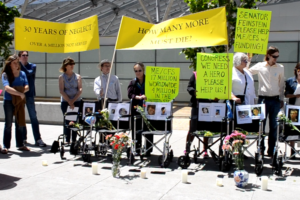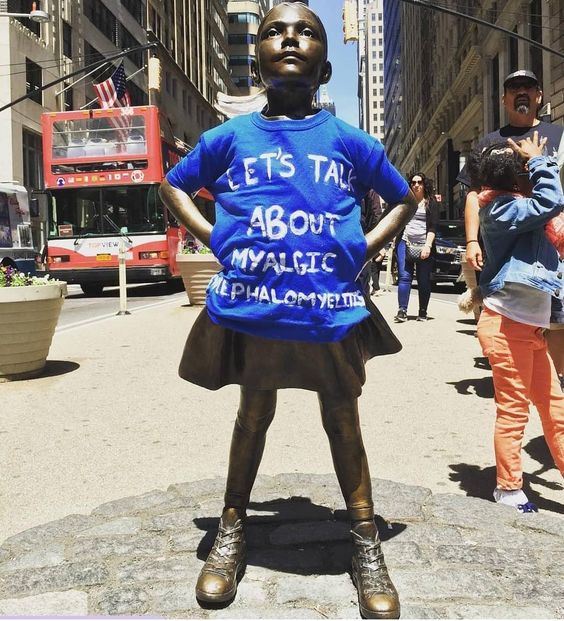May is the month for acknowledging the Millions Missing – the millions of ME/CFS patients who, through the years, have suffered from poor medical care, insufficient research into the cause and mechanisms of the disease, and a paucity of clinical trials to discover effective treatment. May 12, Florence Nightingale’s birthday, is the day we recognize the toll ME/CFS takes on those who have the disease and on their families, who suffer alongside them.
Among the millions missing is a group that is often overlooked. These are the people for whom isolation does not simply mean the loss of friends and the inability to attend weddings, family gatherings, and social events. Isolation, for this group, means rejection, not just by society at large, but by the people closest to them. It means neglect on a scale that is incomprehensible to patients who have loving parents, siblings, and partners.
These “missing” people do not participate in advocacy actions – on any level. They are not to be found on forums, or social media. Their lives are lived silently, unseen by the ME/CFS community at large. These are the impoverished ill, people who have been abandoned by friends and family. Nobody will put their photos on a billboard, or write a news article about them, because these severely ill patients have not one living soul to defend them.
In May, the ME/CFS community remembers patients who have been neglected by the medical establishment as well as the government agencies responsible for their care. This month, the American ME and CFS Society (AMMES) remembers the patients who have been forgotten by everyone.
“Get me out of here!”
The first patient who came to AMMES for help was a black woman in her early thirties. She was pregnant at the time and needed help paying her security deposit. The AMMES financial crisis fund paid her landlord for the deposit and covered an outstanding water bill as well. Not too long afterwards, we received a frantic phone call from her: “Please, get me out of here!”
Our client had been the victim of abuse by a former boyfriend. In spite of a restraining order, her ex had broken into her house and assaulted her. She called her social worker, who phoned the police. When the police arrived they did not take a statement and, in spite of visible bruises on her face, they handcuffed our client and threw her into the back of a police car. They took her to a hospital, where she was placed in a psych ward and given antipsychotics. When I asked our client how it transpired that the police had taken her to a psych ward, she said it was at the request of her social worker. Our client had been diagnosed with CFS. She had no psychiatric diagnoses, and had never been evaluated by a psychiatrist.
Once we discovered what had happened, AMMES immediately wrote a letter to the hospital explaining that our client’s diagnosis was for a neuroimmune disease that had been well established as a physiological, not psychological, illness. We sent copies of the letter to her caregiver, who in turn gave them to the court, as well as to a team of social workers now on her case. A few days later our client was released.
This severely ill woman is black, poor, and female, and she had a diagnosis of CFS, which nobody in her circle of doctors and social workers understood. As a consequence, the full weight of societal prejudice fell on her. She is one of the forgotten.
“My family thinks I am making it up”
With the exception of the first applicant to the AMMES financial crisis fund, who had children, all of our applicants have lived alone. This does not necessarily mean that they do not have living parents or siblings. All of them have had at least some living family members, but their families have rejected them.
Those who have loving relatives find it hard to imagine how families can reject someone who is sick. Yet they do, mostly because they do not believe them. In the words of one applicant: “Over the last 11 years I have been treated like a lazy, worthless, liar.” Nobody believed that she was ill.
A number of applicants have reported similar experiences with family members who do not believe they are really sick. Some have had family members who have ostracized them or who – despite having comfortable incomes – refused to help, or even make a loan.
Other applicants have been treated with outright cruelty: “My brother told me to just kill myself, but before he did he told me that our mother’s condo that I am living in should be his not mine. So I really don’t have family that cares, or understands, or is safe for me to seek help from.”
In some cases, a state of homelessness has been caused by family rejection.
“My family, whose therapist said, “no one sleeps that much, unless they are a drug addict,” kicked me out last year. They have always chosen to have “willful ignorance”, so they did not feel any need to help. I don’t know which is worse anymore, the disease itself and how it hurts me or the hatred and selfish disregard for my life from other people.”
The truth is that no matter how much pain the illness causes, there is no pain that compares to being rejected by people who are supposed to love you. When doctors dismiss patients, or social services deny care, it is infuriating, frustrating, and humiliating. But when your own family does not care, or treats you worse than strangers do, it is heartbreaking.
“Your existence gives me hope in the future”
For the past year, AMMES has been stepping up to help severely ill patients with little to no income pay their bills. Most of our resources have gone to pay rent for patients on the verge of homelessness. We have also paid utility bills, medical copays, transportation costs, food expenses, medical bills and other necessities. We have even paid for a bed for one patient who had been sleeping on her couch. But the most valuable commodity we have to offer is love.
To say we love our applicants may sound like a Hallmark card, but when you demonstrate that you care, you are showing love. When you listen to patients who for years have suffered disappointment, rejection, and denial from all of the people surrounding them, you show them love. When you do your best to alleviate the isolation, humiliation, and hopelessness that these patients have had to endure, you show them love.
This May, AMMES would like you to show our clients some love as well. Our funds are depleted, which means we cannot take on new clients who are in danger of eviction. Nor can we take care of the clients we already have. We cannot bear to see our people evicted or going hungry because of lack of money. We can’t turn our backs on them.
AMMES’ May Fundraiser
Please DONATE to our cause! We launched our spring fundraiser on May 1. We need $15,000 to see us through until the fall, but any amount will keep us going.
Our fundraiser is HERE. Please spread the word everywhere you can!
You can also donate directly to AMMES HERE.
Our overhead is very low, so all donations will go directly into the financial crisis fund. AMMES is a 501(c)(3) nonprofit, so your donation is tax deductible.
Read more about what we do!
HOMELESS: How AMMES Is Keeping People With ME/CFS In Their Homes
Food, Clothing, And Shelter: Providing The Basics To People With ME/CFS
For my birthday, I would like…
It just so happens that my birthday falls on May 10th ! In addition to a pony, I would very much like to have some board members join AMMES. (A social worker would be almost as nice as a pony.) I am looking for people who are healthy, but who have a family member or friend with ME/CFS. You can find out more about Board positions HERE.
There is nothing more satisfying than the work we do! Join us!
Continue reading “Remembering The Forgotten: How AMMES Combats Isolation And Neglect”























